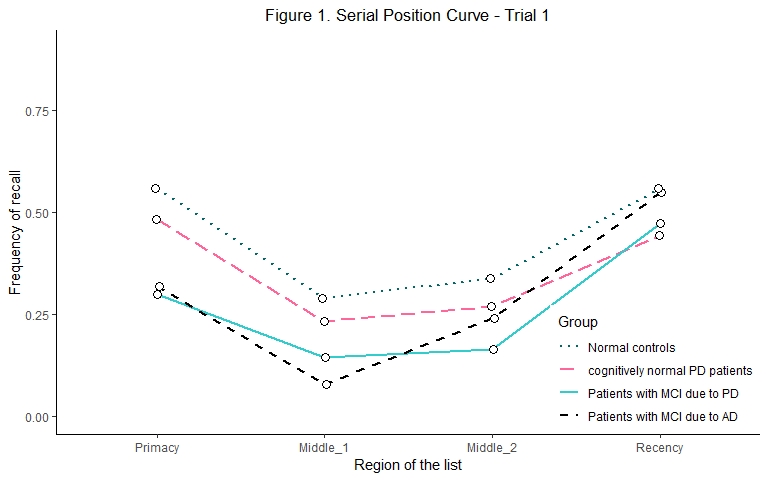Session Information
Date: Wednesday, September 25, 2019
Session Title: Cognition and Cognitive Disorders
Session Time: 1:15pm-2:45pm
Location: Agora 3 East, Level 3
Objective: To compare the serial position effects (SPE) between patients with Mild Cognitive Impairment (MCI) due to Parkinson’s disease (PD-MCI) and patients with MCI due to Alzheimer’s disease (AD-MCI). Furthermore, we aimed to delineate the different origins of SPEs between AD-MCI and PD-MCI. In contrast to AD-MCI patients, we expected a significant relationship of the memory measures with either executive function, attention or working memory (WM) in PD.
Background: The first (primacy region) and last (recency region) items of a word list are generally better memorized than items from the middle region [1]. These serial position effects (SPE) depend on the long- (LTM) and short-term memory (STM) capacity [2].
Method: Four similar groups of subjects participated in the study: 26 PD-MCI patients, 26 cognitively normal patients with PD (PD-CN), 26 AD-MCI patients, and 26 healthy individuals (NC). Verbal episodic memory, verbal span, attentional capacity, executive functions and verbal working memory performance were assessed. Measures for the primacy and recency regions were defined at the first trial of a 16 items word list.
Results: Primacy effects were significantly diminished in both, PD-MCI and AD-MCI patients relative to NC and PD-CN (all p-values <0.01) [figure 1]. Compared to PD-MCI patients, AD-MCI patients exhibited significantly worse ‘delayed-recall savings’. In contrast, in PD-MCI patients – but not in AD-MCI patients – the primacy effect was correlated with measures of psychomotor speed and alertness [table 1].
Conclusion: Impaired retrieval from the LTM is likely due to impaired transition of newly learned material from STM into LTM. Whereas AD-MCI patients suffer from a storage deficit which leads to a reduced primacy effect, the similarly reduced primacy effect found in patients with PD-MCI may be explained by psychomotor slowing and deficient attentional capacity. This suggests that deficits in episodic memory in PD is related to fronto-striatal dysfunction.
References: [1] Foldi, N. S., Brickman, A. M., Schaefer, L. A., & Knutelska, M. E. (2003). Distinct serial position profiles and neuropsychological measures differentiate late life depression from normal aging and Alzheimer’s disease. Psychiatry Research, 120(1), 71–84. https://doi.org/10.1016/S0165-1781(03)00163-X [2] Atkinson, R. C., & Shiffrin, R. M. (1968). Human Memory: A Proposed System and its Control Processes. In K. W. Spence & J. T. Spence (Eds.), Psychology of Learning and Motivation (Vol. 2, pp. 89–195). Academic Press. https://doi.org/10.1016/S0079-7421(08)60422-3 An Abstract entitled “Impaired memory consolidation similarly affects verbal episodic memory performance in patients with Alzheimer’s disease and Parkinson’s disease” with similar analyses was presented at the Deutsche Gesellschaft für Psychiatrie und Psychotherapie, Psychosomatik und Nervenheilkunde congress in Berlin (28.11. – 01.12.2018)
To cite this abstract in AMA style:
A. Meyer, I. Handabaka, MM. Ehrensperger, U. Gschwandtner, F. Hatz, AU. Monsch, RD. Stieglitz, P. Fuhr. A comparison of serial position effects between patients with MCI due to Parkinson’s disease and patients with MCI due to Alzheimer’s disease [abstract]. Mov Disord. 2019; 34 (suppl 2). https://www.mdsabstracts.org/abstract/a-comparison-of-serial-position-effects-between-patients-with-mci-due-to-parkinsons-disease-and-patients-with-mci-due-to-alzheimers-disease/. Accessed May 15, 2025.« Back to 2019 International Congress
MDS Abstracts - https://www.mdsabstracts.org/abstract/a-comparison-of-serial-position-effects-between-patients-with-mci-due-to-parkinsons-disease-and-patients-with-mci-due-to-alzheimers-disease/

